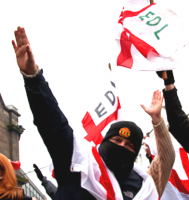Hi - I wrote the IBWM article on Man Utd and appreciate the comments. My two main sources were the Hann/Tilzey interview with Spike Magazine and the Noonan interview with Red Attitude (both available online, both worth reading). Both talk about the links between City and the NF on the one hand and United and AFA on the other (whilst obviously making clear that it wasn't that simple, etc.). The article looks at possible reasons for this political divide, particularly Utd/AFA (the editors removed the part about City/NF - understandably). One is location (stadium near the docks). The other is a possible immigrant support base, which is more complex (and I can definitely see why people have said it's "romanticised"):
1. City's Anglican roots obviously weren't sectarian as such but as I noted in the article, sectarianism was an issue in Manchester at the time. Would Irish Catholic immigrants have been put off the idea of supporting an Anglican team, especially on with links to the Orange Order (http://www.manchesterorange.co.uk/History/st-marks-church-manchester-city-orange-order) when they could have supported a team with secular roots in the L&YR?
2. In 1902, the club decided the re-name themselves and Utd was chosen narrowly ahead of Celtic. Why was this the case? The man who some credit coming up with the name Utd was Louis Rocca, himself the son of an Italian immigrant family in Ancoats (an Irish/Italian area close to Newton Heath's ground in Clayton). He was the one who recruited fellow Catholic club member Busby as manager in 1945. That Utd were subsequently perceived as the "Catholic club" of Manchester in the 1950s isn't my assertion [Stuart Brennan, M.E.N.]. Similarly the idea of City as "loyalist" is a quote from someone writing in the Guardian.
In the article I note that Moss Side (where City moved in 1923) is an immigrant area. The editors cut out the part where I talked about City's black/mixed race fans confronting their NF base. So clearly City have lots of fans with immigrant backgrounds. But it was Utd who became more associated with militant anti-fascism. Now in the article I've reduced this to Salford docker/Irish immigrant support base which is definitely a "romanticised" version. When asked about it, Tilzey suggests Utd/Catholic vs. City/Protestant as a possible reason for Utd's AFA links. The article develops that idea and uses it as a starting point for exploring some of the history of Manchester in a way that I hope was interesting and accurate.
On a personal note, I went to Catholic schools in Kersal and Prestwich where a huge majority supported Utd. Of the handful of City fans, many were purposefully going against the grain but there did seem to be more City fans over in Blackley/Moston (though still Utd areas I would argue). Now I'm living over in Poland, where my estate is covered in "White Power"/"SS" graffiti and no-one really seems to be that bothered about it. I remember seeing NF graffiti/posters back in M25 but (apparently) it was always being challenged (sometimes violently). Over here, it seems like the far-right link is part of the whole football hooligan identity. I wanted to write about the antifascist left and its links with violence and football fan identity.
Happy to look at any "inaccuracies" in more detail (although most of them I'd dispute).
1. City's Anglican roots obviously weren't sectarian as such but as I noted in the article, sectarianism was an issue in Manchester at the time. Would Irish Catholic immigrants have been put off the idea of supporting an Anglican team, especially on with links to the Orange Order (http://www.manchesterorange.co.uk/History/st-marks-church-manchester-city-orange-order) when they could have supported a team with secular roots in the L&YR?
2. In 1902, the club decided the re-name themselves and Utd was chosen narrowly ahead of Celtic. Why was this the case? The man who some credit coming up with the name Utd was Louis Rocca, himself the son of an Italian immigrant family in Ancoats (an Irish/Italian area close to Newton Heath's ground in Clayton). He was the one who recruited fellow Catholic club member Busby as manager in 1945. That Utd were subsequently perceived as the "Catholic club" of Manchester in the 1950s isn't my assertion [Stuart Brennan, M.E.N.]. Similarly the idea of City as "loyalist" is a quote from someone writing in the Guardian.
In the article I note that Moss Side (where City moved in 1923) is an immigrant area. The editors cut out the part where I talked about City's black/mixed race fans confronting their NF base. So clearly City have lots of fans with immigrant backgrounds. But it was Utd who became more associated with militant anti-fascism. Now in the article I've reduced this to Salford docker/Irish immigrant support base which is definitely a "romanticised" version. When asked about it, Tilzey suggests Utd/Catholic vs. City/Protestant as a possible reason for Utd's AFA links. The article develops that idea and uses it as a starting point for exploring some of the history of Manchester in a way that I hope was interesting and accurate.
On a personal note, I went to Catholic schools in Kersal and Prestwich where a huge majority supported Utd. Of the handful of City fans, many were purposefully going against the grain but there did seem to be more City fans over in Blackley/Moston (though still Utd areas I would argue). Now I'm living over in Poland, where my estate is covered in "White Power"/"SS" graffiti and no-one really seems to be that bothered about it. I remember seeing NF graffiti/posters back in M25 but (apparently) it was always being challenged (sometimes violently). Over here, it seems like the far-right link is part of the whole football hooligan identity. I wanted to write about the antifascist left and its links with violence and football fan identity.
Happy to look at any "inaccuracies" in more detail (although most of them I'd dispute).




